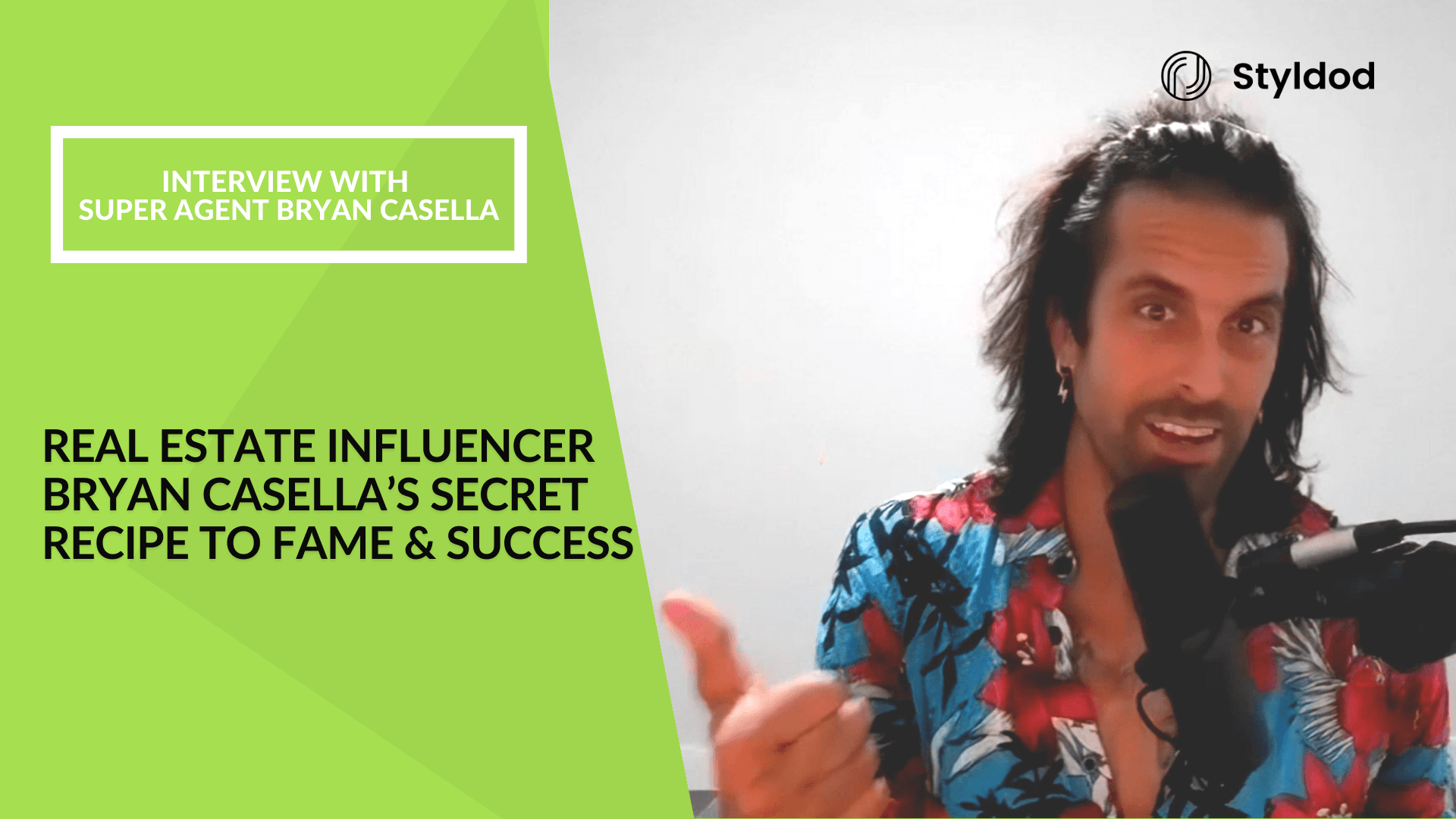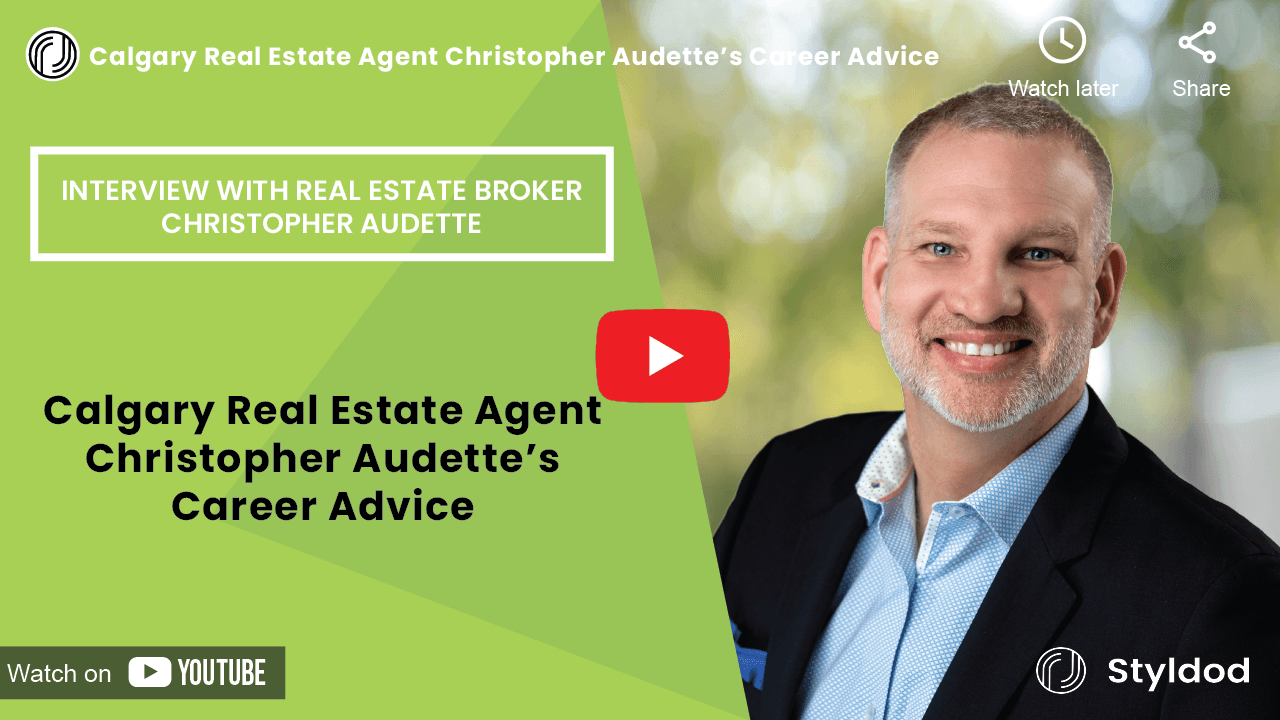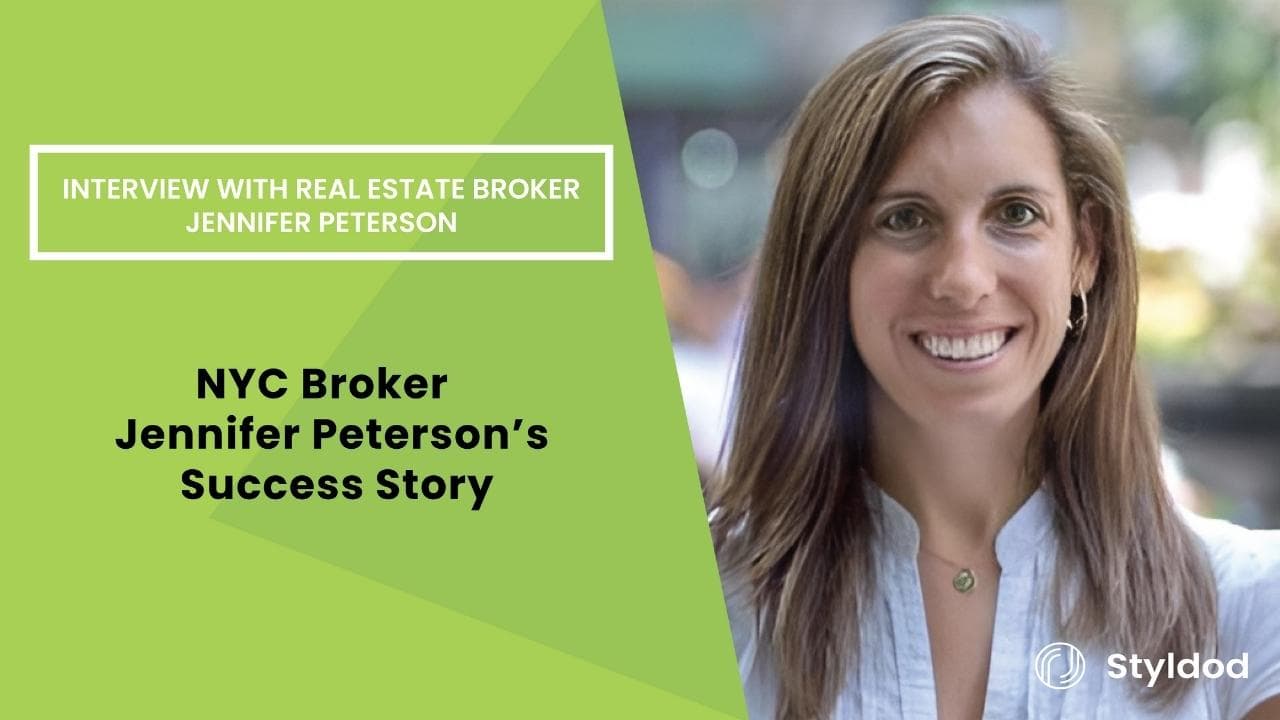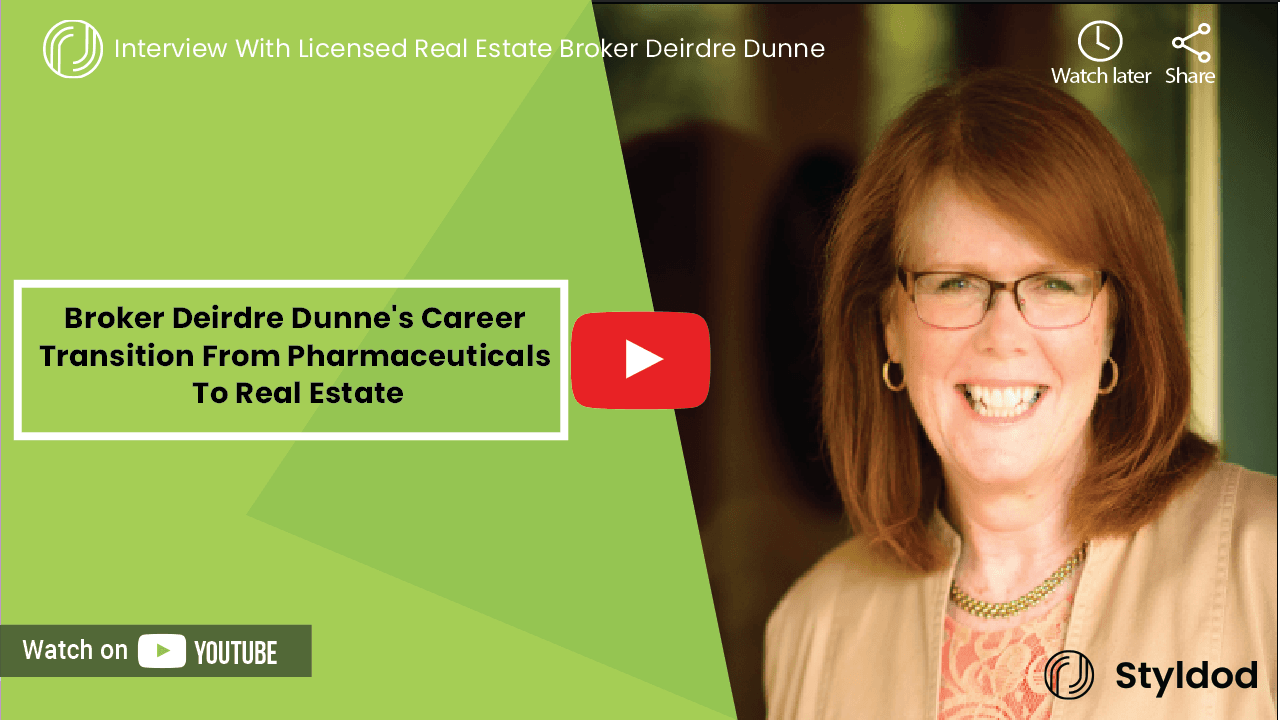
He’s a top-producing real estate agent, team leader of Team BC Real Estate, and a sought-after coach. Athletic and charismatic, he has over 200,000 subscribers on YouTube. But it didn’t come easy to him. Hailing from an immigrant family, he was inspired by his father’s hardworking attitude and lessons learnt from being an athlete. Having found his love for basketball at a young age, he gave it his heart and soul, only to be pulled down by an injury that wouldn’t allow him to play the sport anymore. Here’s the inspiring journey of real estate influencer Bryan Casella discovering his calling for real estate and how he became a successful agent. In this exclusive interview with Team Styldod, he shares invaluable tips and strategy lessons for newbies and mid-career professionals to navigate and thrive in the industry.
Star Real Estate Agent Bryan Casella's Exclusive Interview with Styldod
If becoming a real estate superstar is your dream, then this interview is your playbook to get started on your dream career path.
For the people who don’t know you, who is Bryan? Tell us a little bit about yourself and how you got into real estate.
My full name is Bryan Casella, and I’m originally from Argentina, South America. My parents immigrated to the United States, and I was the first one from my family born on American soil. I grew up in California, Los Angeles, where my parents were figuring out life with new careers. They didn’t come with a lot of money, so my dad became a truck driver, and my mom would take up odd jobs to make money. So growing up, I didn’t have too many luxuries; my family in South America is pretty poor. It’s very third world in Argentina; 70% of the population lives in poverty. So, it’s pretty rough. My father’s hardworking spirit was instilled in me early on, so at age 10, I started playing basketball and completely dedicated myself to the sport. I did well in high school, secured a scholarship to play in college, and played professionally in Spain for a couple of years until I got stumped down by a bad injury. I underwent surgery and realized that my basketball career was over. After six months of being unable to walk, I went to South America and worked with my dad’s brother. It was a good year and a half of relaxing before returning to the States to start a new career. Once back, I was lost. I didn’t know what to do. Until then, I ate, slept, and breathed basketball. Running my own business was a childhood dream, and after some soul searching, I came across real estate. Real estate seemed like an exciting, challenging career that would allow me to set my own schedule and earn commission. I signed up for courses, and by the summer of 2013, I was a licensed real estate agent. From then my business exploded, and I haven’t looked back since.
Do you think the hard work instilled by your dad and the sports discipline you developed helped you in your career?
I would say it has definitely contributed. The people who get into real estate don’t realize this, but even if you have help in the form of coaching/ training, you’re still by yourself. You’re building your business by yourself. So that can be emotionally intense for a lot of people. It tests your strength. So if you’ve been through difficult times and overcome challenges outside of real estate, it can definitely help in your career. If you don’t have a tough spirit, it’s not going to be easy. It’s simple but not easy.
What drives you in your career?
Well, that I think is something that changes for people over time. When I first got into the business, part of it was like a chip on my shoulder; I wanted to prove people wrong. Even when I pursued my basketball career, everyone was against me, nobody supported me. So part of it was proving people wrong to show them that I’m the best. ‘Hey, I said, I was going to be a real estate agent, I’m going to be #1.’ I don’t think that ego is the best thing to motivate you, but it can drive you a lot. The other part for me was my childhood experiences of growing up and seeing people around me struggling for money. Nobody in my family made enough money to be comfortable. Seeing people suffer mentally was difficult for me. So I wanted to put myself and them (family) in a position where they didn’t have to worry about money anymore. I wanted to be the first one in the family to break that chain and say, ‘Hey, we’re okay now.’ I felt the responsibility to build the foundation and pass it on to future generations. This was a big driving factor in the beginning because everyone was depending on me.
If you were to go back to the beginning of your real estate career, what would you do differently knowing what you do today?
A lot of what I did was correct, from showing up every day to doing the fundamental work that many people don’t do. But, there are a couple of things that I would change. Even though I saw the potential in social media back then, I wasn’t purposeful or consistent in putting out content. I should have dedicated more time to that domain.
Secondly, I realized that I was my biggest enemy in the beginning, with negative self-talk, getting in my own way, stopping myself, not managing my emotions, etc. So if I were to go back, I would’ve invested a lot more training in that. Because I was still very immature back then, I didn’t realize the power of positive thinking and emotional intelligence and considered it dumb and unimportant. In the first couple of years, agents feel a lot of stress and pressure. Managing them properly will make you more efficient.
Thirdly, as new agents, we tend to hunt down new clients while neglecting the people we already know. “A big problem of mine was not using the network of people I already knew. When I sat down and wrote the names of people I knew, I realized that I knew quite a few. My first transaction was from a person I already knew. Had I tapped into that opportunity, I could have gained more momentum faster in my business.”
Do you have any stress management tips for agents?
I think a lot of people don’t distinguish between what you can control and what you cannot. I think people worsen their stress by focusing on things they can’t control. Let me give you an example. I used to be in California, and now I’m in Florida. California has earthquakes every couple of years. Let’s say when I started my business, a big earthquake hit and shut down real estate for two months. Do I have any control over it? No. Now, that’s an extreme example, but a lot of agents will focus on such things and try to solve them when it’s not even in their control. On the flip side, what can I control? I can control how I think about it, the actions I take, my conversations with people, what I do in my day, waking up on time, etc. The more you let go of control and accept the fact that bad things are inevitable, you’ll be calmer.
What do you think is the top skill an agent needs to have?
“I think if you want to be a successful real estate agent, you need to become a fantastic communicator.” Technology is so prevalent now that people have forgotten to speak to another human being. You don’t have to be a great speaker, just be good or even okay. If I grab somebody up the street today and ask them to go speak to a stranger, they’ll get scared. ‘Oh, what do I say? What do I do?’ That makes me laugh because, if I know that’s a real estate agent, I’ll be like, ‘dude, this is your job. You’re supposed to be good at this.’ We’re helping people buy and sell homes. So there are some sales parts to it too, where we have to educate people and guide them to make a decision. That’s a skill set that a lot of people don’t work on. I have a team in 14 states across America, and every day we drill our communication skills to get better. That’s why I have a lot of new agents on my team selling houses right away.
Another one I would say is treating their time in the business like an actual business. Tracking their money, having a schedule, having a standard, thinking about what your ideal client looks like, what do they do. Most people who get into the business act like an employee. They expect someone to tell them when to show up, what to do, they think they can only do 9 am to 5 pm. That mentality switch from employee to CEO will make it better for them because many people who come to real estate are not ex entrepreneurs, including myself. One example is taking responsibility for everything. If I end up not getting a deal and the client goes to another agent, I don’t blame them. I’ll look at myself and ask what could I have done better? What do I need to change? Do I need to talk to more people? Do I need to work on my communication? It forces you to build and fix all the mistakes you’ve been making to become better. When you do that over one, two, or three years, you start building your business a lot bigger and a lot faster.
How much does marketing matter in building a real estate practice? What are your go-to marketing tools?
Marketing is huge. Marketing is the way people become aware of us and our brands. There’s so much you can do. Working with a social media strategy is one of the powerful tools because almost everybody is using it. Most people on the planet spend the majority of their time on their phones or the computer, and a lot of that time is spent on Facebook, YouTube, Instagram, and other popular social media applications. That’s one of the reasons I started doing it right away. But “something else people miss is the effect that video has. Video is powerful.” When I was a kid, we would watch the TV and if we saw somebody on it, we were like ‘Whoa!’. So you almost have that tremendous respect for that person. You see them as an expert, and there’d be an aura around that person. When I noticed this, I was sending people videos, it had the same effect. They viewed me as an expert. They respected me more. When I went to meet them, there was already a connection established because they had already seen me on video. They’d say ‘Oh I saw those two videos you made on how to price my home, it was really good.’ It helped build trust and connection.
Aside from social media, one of the best things I did when I was new was door-knocking and canvassing through phone calls. For a new agent who has more time than money, those are going to be two key ways for you to talk to people every day. When I was new, I knocked on 100 residential doors and 200 phone calls every day, six days a week. I ended up having 40-50 conversations every day. That sounds like a lot, but out of those numbers, only a small percentage will be interested. So social media combined with meeting people in real life will help stay you on top of mind. I built 200k followers on YouTube organically by producing content and never by running ads.
How do you stay on top of mind with your existing and former client base? Any engagement tactics you can share?
Yes, we’ve had a lot of repeat customers over the years. We just helped somebody three weeks ago whom we had helped sell their home three years ago. So there’s a lot you can do to stay in touch. Social media, yes. Some clients with whom you do business end up becoming your friend, and if they follow you on social media, they will see you all the time.
Another thing we do is client appreciation parties. I’ll call my vendor team consisting of my lender, the escrow company, the title person, the home inspector, and we’ll all pitch in to throw a party. We call and send invites, and normally 8-130 people show up for it. Apart from that, we send weekly emails, marketing content, and birthday cards.
Who’s your favorite kind of client? Do you instinctively know who is worth spending your time on?
There are so many types of clients we like. A lead source we love is an expired listing. These clients make up 40% of our business and are my favorite because when we get in touch with them, they’re upset, mad, hate real estate agents, and rightly so (laughs). I like it because it's a challenge, and usually, those people are extremely grateful once we get the job done because then they can move on. These types of clients are exciting and also show a lot of gratitude.
The second question - knowing if people are worth your time, I think that’s something a real estate agent develops over time. When I was new, I didn’t know. I was just excited to talk to somebody. But now I can tell within seconds if somebody is serious or not. Once you’ve talked to thousands of people over the phone and in person, you know what’s being said. You pick up on these things because you get better as you become an expert. “That’s why I tell agents that the work you put in to build your communication skills, none can take that away from you.” Even though I just moved from California to Florida 6 months back, I don’t feel like I’m starting over because I’ve brought all those skills and knowledge with me.
What are your thoughts on virtual showings, virtual staging, and other incumbent technologies in real estate?
We’ve been doing them for a while. Especially because I’ve been active on social media for years. If you go to my YouTube, you’ll see some featured home tours. I always say there are four things you need to do to sell a house - the price needs to be good; the pictures and the online presentation has to be good because 88% of buyers start their home search online. They go through houses and look at pictures so the first impression is really important. Drone footage and virtual tours fall into this category and will entice more buyers. If I have more buyers in the house, I’m going to get more offers and get the house sold for more money. The other two are making sure the home is available most of the day for buyers to come, and the last one - it shows well. It smells good, it looks neat, and the overall home presentation is good.
The virtual presentation of homes, I’ve been doing for years. When Covid started last year, for two months, they didn’t let us show homes. For me, nothing changed. I had been doing this for years. However, for the majority of my industry, it was a harsh awakening. I think it was always important and Covid just made it obvious.
How has COVID impacted real estate and the way you do your business in any way?
It hasn’t made much difference to my business. Did we have to make adjustments? Sure. Every state and city in America had different restrictions. I’m in Florida now, and the place is 100% open. Nobody has to wear a mask. Everything is normal. In California, it’s the opposite. I think it really depends on the agents where they were located. When I was quarantined in Los Angeles last year, they didn’t let us work for two months. So in that short time period, yes things changed because I couldn’t even meet with people. If I had somebody interested in selling a home, we had to meet via Zoom. Now, the benefit is, I’ve been doing this stuff for years. I had been doing Zoom meets every day. So when I say it stayed the same for me, it's because a lot of the adjustments that other people had to make, we were already doing. You look at my brokerage EXP Realty; it’s all virtual. We log on to the virtual world; we talk to people on Zoom world, so we were already doing things virtually. So the step the industry had to take, we had already taken it. The adjustment for us was very simple, and it was basically business as usual.
Real estate isn’t a 9-5 job. How do you balance your personal and professional life?
I think this is something new agents need to understand. When I started as a real estate agent, I didn’t have the luxury to take days off. I told myself that I wouldn’t have to do it forever, but I would have to sacrifice in the beginning and work till maybe 7 am to 7 pm. I couldn’t do 9 - 5. That transition, in the beginning, did cut into my personal life but I knew in my mind that it wouldn’t be forever. I just had to build my foundation then. I had to sacrifice temporarily to make time in the future. So for the first two years, I worked pretty much all day.
Then things started changing. After two years, I had some business, money, and time, so I could hire people to be available when I wasn’t. I could hire an assistant or a transaction coordinator to scale my business. Once I started doing that, I got some of my time back. The first person I hired was a virtual assistant. Originally I had them working four hours a day in the evening for me. At 5 the virtual assistant took over and handled phone calls, emails, and contracts. That way, in the evening I had time for myself. Later on, that graduated to me hiring a full-time assistant. Now that assistant is with me, and I’ve delegated a lot of the administrative work to that person. I have more time for me now which I can spend finding new clients. So that’s a ladder that agents have to go through. In the beginning, you sacrifice, but as you start building your business, you put systems in place to have some of your time back to either spend it how you want or use your time on the most income-producing activities instead of busywork.
Vision, strategy, and time management have made Bryan Casella a respected real estate influencer in the country. He never misses a chance to work on self improvement and makes it a point to stay relevant and ahead of the curve. Check out his YouTube channel, and Website here.
Wish to read more such interviews? We have more coming soon. Meanwhile, here’s photographer Scott Chandler’s 2 cents on real estate photography.
Want to try out Styldod to see how we can help beautify your listings and make them sell faster and for more value? Click here for a free trial.
Styldod is a design-tech company that aims to simplify real estate marketing and help agents present homes in their most favorable light online by reimagining and automating the listing photography process. Having begun as a virtual staging company, today, Styldod has affordable and best-in-class products and services for every facet of real estate marketing and photography. Styldod’s suite of services include virtual staging, image enhancements, floor plans, virtual renovation, 3D renders, 360 degree virtual tours, and Matterport virtual staging, to name a few. We're trusted by over 10,000 realtors from all over the US and from companies like ReMax, Coldwell Banker, Keller Williams. Know more about us at https://www.styldod.com.



